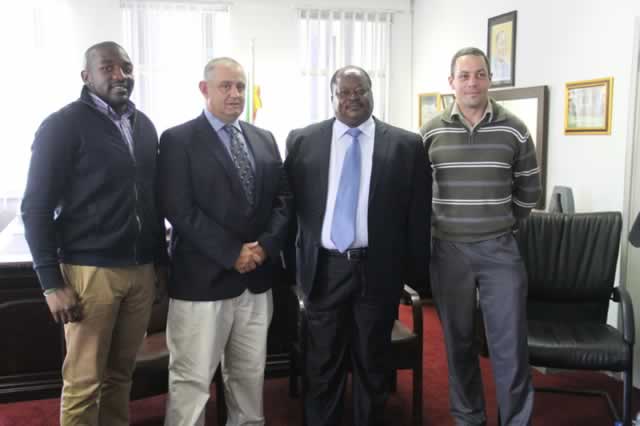Cde Chambati: A champion of economic empowerment

 A distinguished administrator, politician, businessman, founding member of the Zimbabwe liberation movement and Finance Minister, Cde Ariston Maguranyanga Chambati, died after a short illness at his home on October 7, 1995 and was buried at the national shrine.
A distinguished administrator, politician, businessman, founding member of the Zimbabwe liberation movement and Finance Minister, Cde Ariston Maguranyanga Chambati, died after a short illness at his home on October 7, 1995 and was buried at the national shrine.
Born on November 15, 1934, Cde Chambati attended primary education at Bradley Institute in Mashonaland Central and part of secondary education at Howard Institute in the same province and Tegwani Secondary School in Plumtree. After completing his education, he worked for a number of firms in Harare. His opposition to apartheid and minority rule of the settlers’ Rhodesia regime made it inevitable for him to go into politics at an early age. In 1956 he joined the City Youth League in Harare.
He again joined the Southern Rhodesia African National Congress and subsequently became treasurer for the Harare branch (Mbare). In 1960, he was one of the founding members of the National Democratic Party (NDP).
When NDP was banned, he joined the successor organisation ZAPU. As these organisations were banned one after another, he never wavered. He continued to oppose racism and settler rule, and to advocate majority rule and independence.
He wrote numerous articles and pamphlets challenging white supremacy.
When ZAPU was banned in 1964, he went abroad to seek further education. He was admitted to Princetown University, USA where he obtained the following qualifications: Diploma in International Relations, Certificate in African Studies at Syracuse University, Bachelor of Arts Degree at the New School for Social Research, Masters Degree, New York University and a PhD from Lincoln College, Oxford, England. He received numerous academic honours, distinctions and scholarships such as the African Institute Scholarship in 1966 and the Lincoln College Middle Eastern Research Grant in 1970 amongst many others.
While studying abroad, Cde Chambati was an active member of ZAPU.
In 1975, he was elected Deputy Secretary General of the ANC (ZAPU). In 1976 he attended the Geneva Conference on Rhodesia, acting as secretary to the ZAPU wing of the Patriotic Front delegation. In 1979, he became ZAPU’s Secretary for Research based in Lusaka, Zambia. In the same year he took part in the Lancaster House Conference acting as a joint-secretary for the Patriotic Front delegation. He worked well with all delegations to that important conference, putting his knowledge and experience at their disposal. In 1980, Cde Chambati returned home, and was elected to the first Parliament of independent Zimbabwe as a member of ZAPU for Mashonaland West provincial constituency. He was an able debater and influential parliamentarian.
He was subsequently appointed Zimbabwe’s Ambassador to Bonn, Federal Republic of Germany in October 1980. He returned home in 1982, and remained active in politics. Between 1984-7, he was actively involved in promoting unity between ZANU and ZAPU culminating in the signing of the historic ZANU-ZAPU Unity Accord of 1987.
Realising that political independence alone was not enough, Cde Chambati was amongst the first people who took it upon themselves to advance the cause of the majority in the economic sphere. This saw his rise to sit on several boards both in Zimbabwe and abroad. These included: Barclays Bank of Zimbabwe, Munich Reinsurance Company of South Africa and the African Lakes Corporation PLC. In 1984, he joined the board of TA Holdings as a trainee manager. Later he was appointed chairman and chief executive of the group. He saw TA expand into the largest local multinational, employing 10 000 people.
In 1994, Cde Chambati was appointed to the Central Committee of the ruling ZANU (PF). He contested and won the 1995 Parliamentary elections in Makonde, Mashonaland West Province. His return to Parliament was welcomed by many people in his province.
As Cde Chambati’s main interest was in financial and economic management, it was no surprise when he was appointed as the Finance Minister.
This entailed him leaving behind lucrative packages as chairman and chief executive of TA Holdings Ltd to take up the less lucrative ministerial post.
This demonstrated his commitment to the ideals of realising both political and economic freedom. The Ministry of Finance, being central to the pursuit of economic development, was a challenge that Cde Chambati accepted only to be cut short by his untimely death. Within three months of taking office he presented a comprehensive Budget statement to Parliament. One of his major concerns in the economic sphere was the economic empowerment of black people.
He took several measures to provide funds to black businessmen so that they could enter the financial and economic markets and compete effectively.
At the time of his death, Cde Chambati was survived by his wife Diana and five children. — A Guide to the Heroes Acre.











Comments